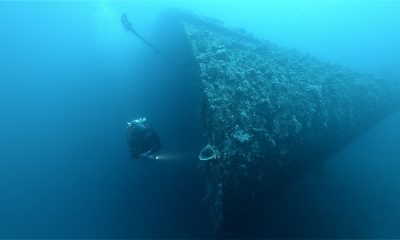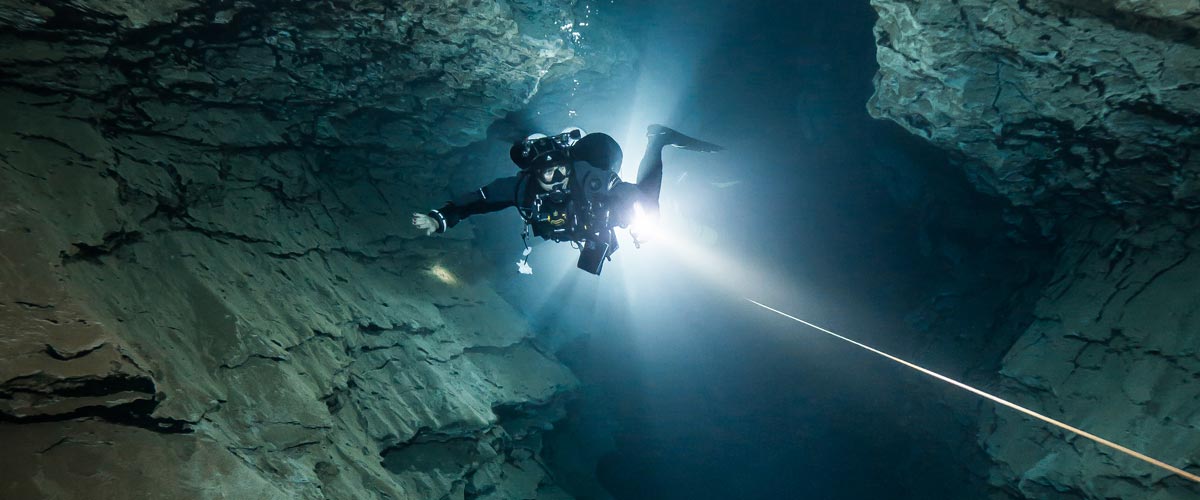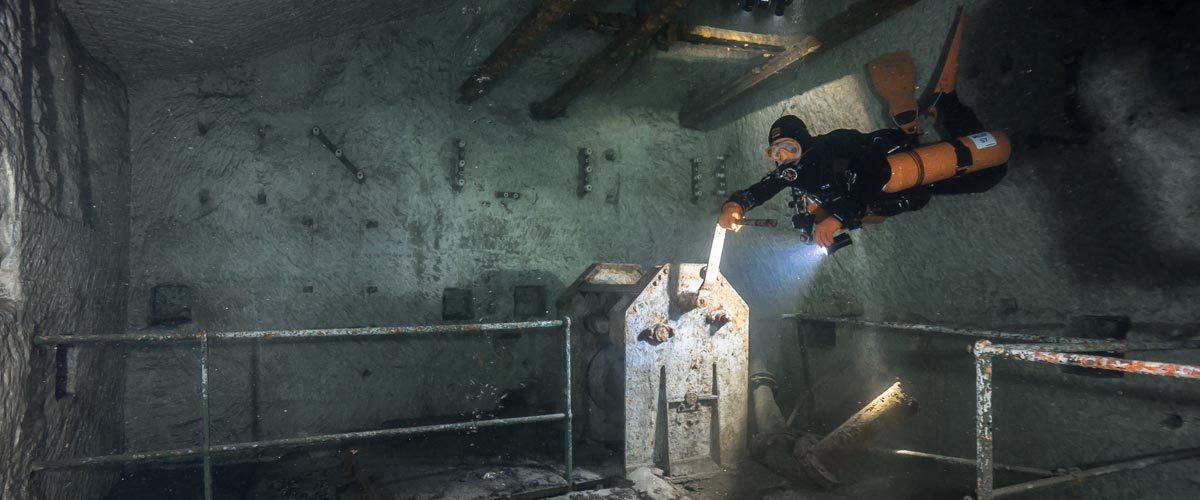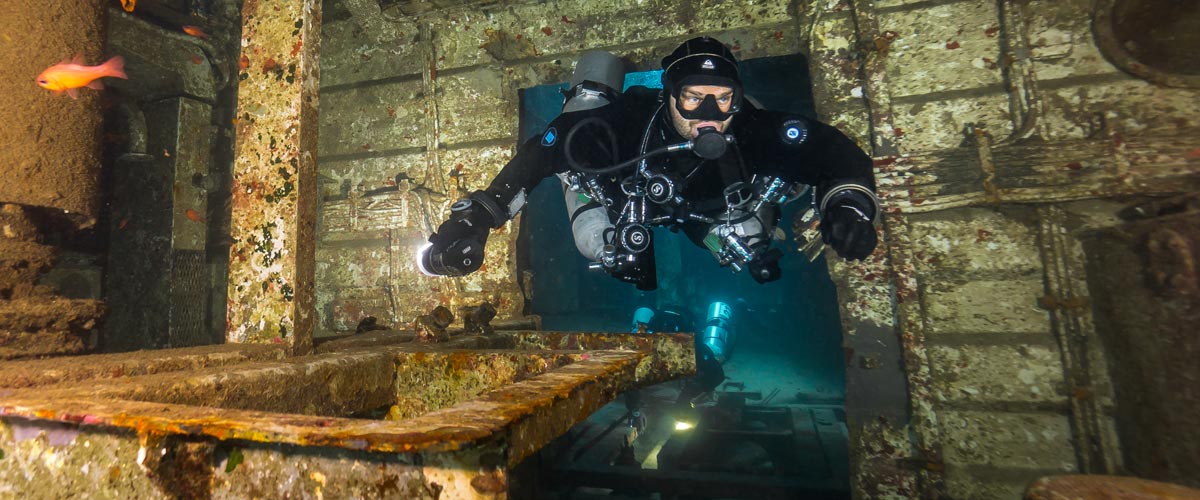Dive Training Blogs
Being Alert: A Subtle Lesson in the Rescue Diver Course
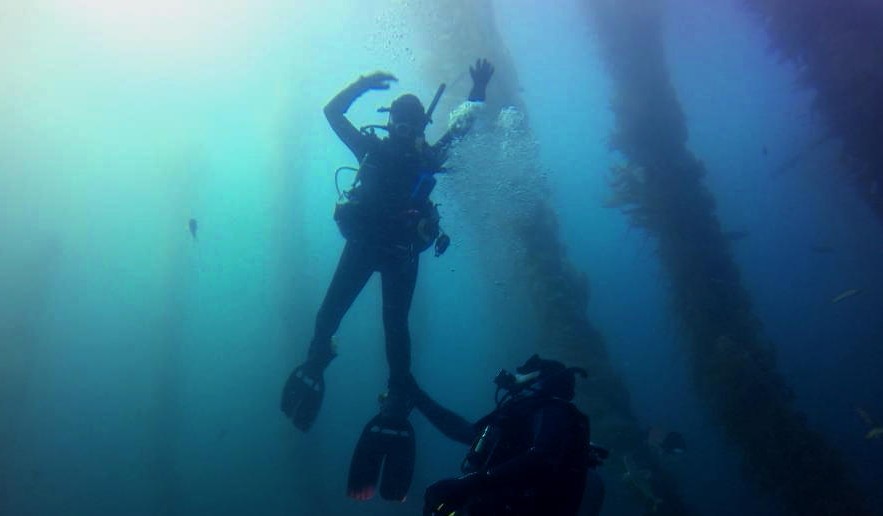
“I queried those at the back of the boat about whether Al had gone into the water on purpose, fallen in by accident or something else. No one could say. Confusion threatened to overtake the situation.”
Bill Powers, a San Diego SCUBA instructor, described the above brief moment on a liveaboard in a recent article he wrote regarding a dive accident where a diver entered the water without his dive buddy, became unconscious and immediately sank to 84 feet (25.6 meters). Were it not for a few attentive divers and quick thinking to help the victim, this dive accident could have turned into a tragedy. Lucky for ‘Al’ he lived to dive another day.
Before I was SCUBA certified I had a conversation with an assistant DM who told me about how important being rescue certified was. After hearing her describe a few scenarios where her rescue certification came into use, I was determined to complete the rescue course as soon as possible. Most divers that I’ve talked with about the rescue diver course agree that it is one of the most fun and rewarding courses to take. Some divers felt that after taking the course, their confidence level skyrocketed and they became better divers because the knowledge they received helped them navigate through scenarios which they previously found daunting. Others were simply happy for the knowledge given during the CPR portion of the class. In the end, the rescue diver course could easily be the most valuable course one can take.
By the time I took the rescue course, I had already spent a lot of time in the ocean and had logged more than 80 dives. I was comfortable in the water and confident in my skills as a diver but still nervous about the class itinerary. Dragging people across the sand? Giving rescue breaths through the surf zone? Am I going to die doing this? My nervousness increased when I realized I was the smallest person in the class with the least amount of body weight and not a lot of upper body strength. I had to get through it! And of course, I did.
But, for me the most important lesson was not learning how to take someone’s BCD off and give him or her rescue breaths at the same time; though I appreciate the knowledge and enjoyed the challenge of it. And despite finding it extremely useful to learn how to protect someone’s airway while bringing them through the surf, I was more nervous about the constant but accidental salt-water sinus flushes when playing the victim (everyone finally did get it right in the end). My arms and legs ached for a few days after dragging a victim across the sand but at least we laughed between the strenuous groaning while accompanied by cheers of “you can do it!” And now I know I can.
At the end of the day, the most significant piece I took away from the course was learning to be alert. We were all told from the start of the course that we should be watching other divers for signs of stress and for improperly assembled gear. One of my favorite classes was when I was instructed to become a stressed diver before we got in the water (mimicking the kinds of stress behavior a diver may exhibit before a dive). I was normally conversational and interacted with fellow student divers, but this time I casually slipped away and sat on the edge of the pool. I wasn’t myself and though it took a while, someone (one of my dive buddies!) finally noticed that I was acting odd. Another favorite class was when I was asked to strap my tank improperly and my dive buddy had to figure out what was amiss. On another day, we all had something wrong with our gear and had to find and correct it on each other. These moments were for me the moments that changed my perception of my dive environment.
Why was that change in perception important to me? In the open water certification class we learned that a chain of small, seemingly unimportant events may lead to a dive accident. For example, first smashing your toe with your tank, then having to use a borrowed piece of equipment because you forgot yours, added with a new environment and maybe a leaky mask could put you into a panic resulting in a rapid ascent and a trip to the hospital. An attentive dive buddy or group of divers may be able to recognize signs of stress and know how to put their fellow diver at ease, hopefully putting a halt to the sequence before it goes too far. Or you may recognize your own chain of events beginning and do what’s needed to either complete a successful, safe dive or call it if you’re too stressed. It’s important to take note of what you and other divers around you are experiencing and equally important to adhere to buddy checks before each dive. How are the divers around you acting? Where are they at mentally? Were they distracted while gearing up? Are they having trouble with seasickness or are they uncomfortable in waves? What’s going on around you? Are you prepared to exercise the skills you learned in your rescue certification class at any given moment?
Even though I can’t stress enough the importance of practicing underwater skills, through my rescue certification I’ve also learned that it’s equally important to be observant before your dive and practice being alert to what’s going on around you. It’s easy to become preoccupied with the social aspect of the pre-dive that we forget that there are things to look for above and beyond the usual gearing up routine. I think back to Bill Powers and what happened during his liveaboard trip. The divers who remained calm and were alert to a situation that quickly went bad may have prevented a death. That scenario reinforces my belief that it’s smart to keep one eye on your buddy and another on those around you. And while chatting with fellow divers, keep an ear out for sounds that could cause concern. Without the rescue course, I may not have known to be aware of these things, and so much more! I’m baffled at divers who have yet to take the rescue diver course; it is inarguably the best class I’ve taken and I have no doubt that those who have yet to take the class would feel the same way.
For more from Lora, visit www.TranquilDeep.com.
Blogs
Intro to Tech: What is it about?
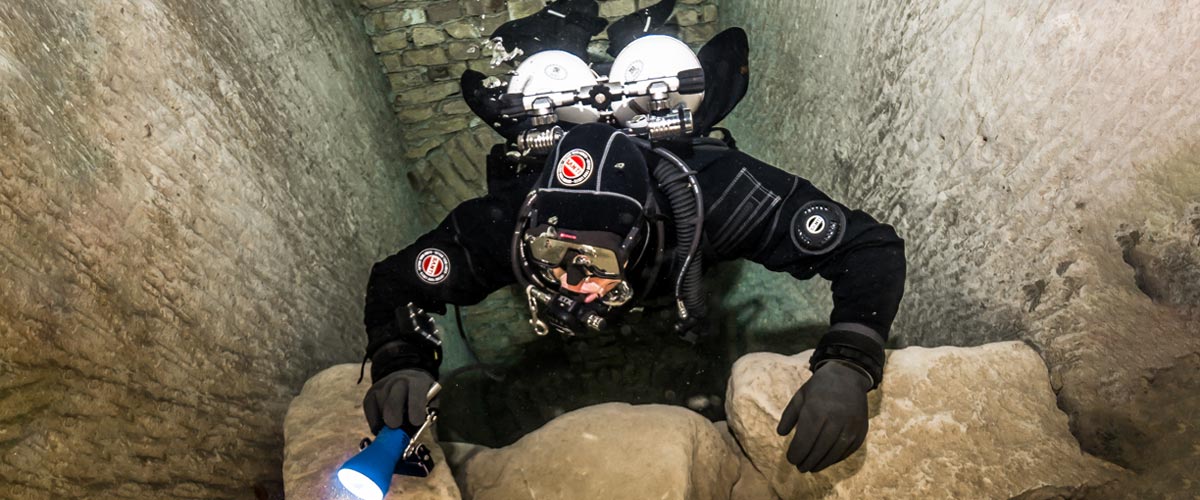
Article by José Pablo Mir
Pictures by Cezary Abramowski
The world of technical diving is exciting. It opens the door to new sites, depths, and bottom times. More importantly, it opens our minds to a new way of planning, facing, and experiencing dives, even those not purely technical.
Becoming a technical diver is a process, and like in other aspects of life, we should find the proper entry point that suits us best based on our knowledge and experience. The Introduction to Technical Diving course from TDI -the world’s largest and most recognized technical diving teaching organization- is the best option for divers who have yet to gain experience in the fundamental aspects of this new practice. The course’s content and its embrace of new techniques and technologies make it possible to acquire a solid foundation to learn and gain experience in this practice properly.
Becoming a technical diver is not something that happens overnight, whether deciding to become one or receiving a certification card stating we are now technical divers. It is a slow process extending farther away than any introductory course. It requires effort and dedication. But it will bring us satisfaction from day one -or two.
It is a matter of mentality
First, we must understand and accept that technical diving, involving greater depths, longer bottom times, exotic gases, virtual or real ceilings, and more, comes with higher levels of risk than the sport diving we have been practicing until now.
Although this discussion usually starts with a warning about risks, as I’ve done in the previous sentence, our practice is not a game of chance.
Technical diving is a rational activity that requires maturity and good judgment, and we will put everything into ensuring that each dive is a successful one -meaning we return from it safe and sound. With this understanding, we will strive to establish a mental attitude more aligned with our practice and its realities.
This new “technical diver” mindset we will develop will lead us to be more cautious in our executions, more analytical in our plans, more rational in our strategies, and more detailed in our procedures.
Experience will keep teaching us to know ourselves better, to keep our anxiety and other emotions under control, and to manage our impulses. Over time, our senses will sharpen, and we will be more attentive to the particulars of the situation we find ourselves in.
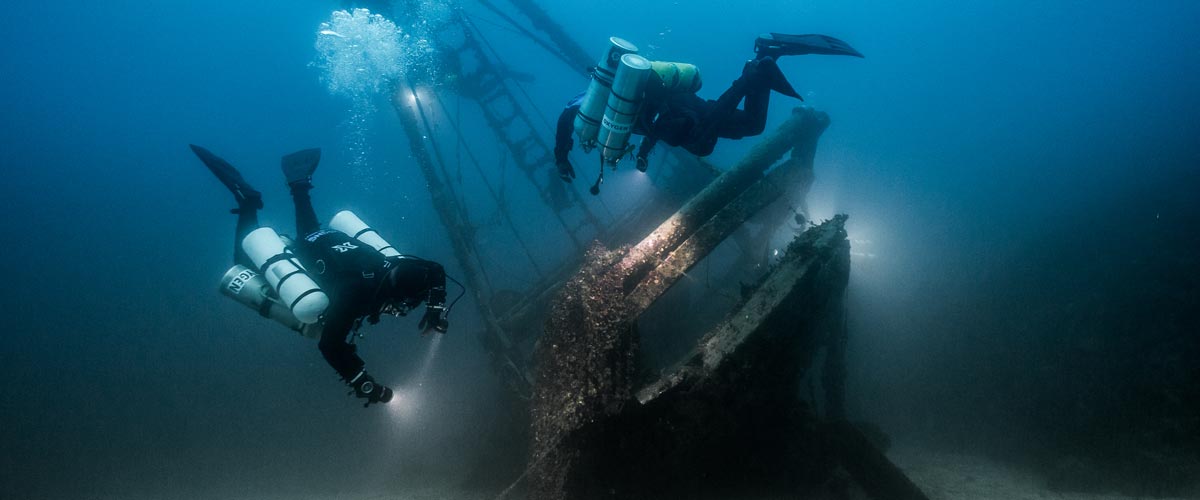
Strategies and procedures
Our strategies, those broad guiding lines tracing the path to follow, from how to approach planning to where, with what, and how we are willing to get there, will be more specific and more practical. Not because they magically become so, but because we will consciously and deliberately frame them that way.
We will establish clear, concise, and realistic procedures. Not only for the undesirable situations that may present themselves but also for those that are part of our dive objectives.
Even though, as technical divers, we often use equipment different from what we were previously accustomed to, it is essential to note that the gear does not make the diver. In a way, we could consider such equipment as the necessary tools to implement what our goal seeks to achieve, according to our strategies and procedures.
Technique plays an important role
We must put our greatest effort into learning and perfecting the different techniques we will be acquiring. Buoyancy, trim, propulsion, cylinder handling, deploying DSMBs and lift bags, valve drills, and more are essential skills we must begin to master to progress in our art. What we cannot do, when we need to do it, can harm us.
Our techniques must be effective and achieve the purpose for which they were devised. But they must also be efficient and require the least resources possible, including the time they take and the effort they demand. Effectiveness and efficiency will prevail over beauty and other considerations that may come to mind, although none of them should be mutually exclusive. A technique executed efficiently and effectively tends to have an inherent beauty.
Refining techniques is a lifelong mission. Some of them will be easy to master from the go; others, on the other hand, will be our life mission and will require many repetitions just to resemble the idea we have in mind of how they should be executed.
We must consider the environment
Our learning, the needs and musts of the practice we engage in, the experience we gradually gain, our strategies and procedures, and even our equipment and tools change with the environment.
Diving in the ocean, everything about us must be suitable for ocean dives. Conditions there rarely emulate those found in a pool, lake, or river. Variable winds and currents, greater depths, visibility conditions, other divers with uncertain skills around us, marine life, maritime traffic, distance from the coast, and many other factors add complexity and uncertainty.
It is never necessary to master the pool on the first day, but planning and aspiring to gradually cope with the ocean’s conditions is essential.
The cost of good training
We are aware that our resources are often scarce in relation to the possibilities of use we could give them if they were not. To a greater or lesser extent, we are part of the economic reality in which we are embedded.
Fortunately, the cost of good technical diver training is not an entry barrier. Comparing training and equipment costs, we see that the former are generally lower. Yes, lower cost for personalized service, essential to our future
performance and safety, than for a series of mass-produced products that are mere, albeit necessary, tools for an end.
The value of good training
The value of the training we received encompasses a range of characteristics, from emotional and methodological to technical and technological. TDI and its Introduction to Technical Diving course offer a deep and modern approach, with a teaching strategy that aims to create thinking divers, not merely obedient ones.
As technical divers, our knowledge is our primary tool. In this type of activity, what we don’t know can harm us.
Is this course optional?
Unfortunately, the fact that this Introduction to Technical Diving course is not a prerequisite for any subsequent training is an invitation to consider it optional. And we all know what usually happens to “optional” under budget constraints.
However, this course should be seen as optional only by those divers who are somehow familiar with the use of technical equipment, who have a mindset more in line with the requirements of this type of diving, who plan and execute the dives the proper “technical” way, who know their gas consumption rate, who are not intimidated by non-decompression tables, who feel comfortable using their dive computers, and know the techniques and have at least an acceptable level of buoyancy, positioning, and propulsion. Those can go straight to a more advanced training course, such as TDI’s Advanced Nitrox.
We must ask ourselves whether or not we are in that group.
Remember our goal: to have fun
Recreational diving is our passion. Jumping into the water carrying heavy equipment and having properly dotted our I’s and crossed our T’s have only one ultimate goal: fun. This is the activity we have chosen as a hobby. We must enjoy it; it must give us pleasure and make us vibrate.
Having a good time is not optional!
Blogs
Four opportunities to go pro in 2024 with Dive Friends Bonaire
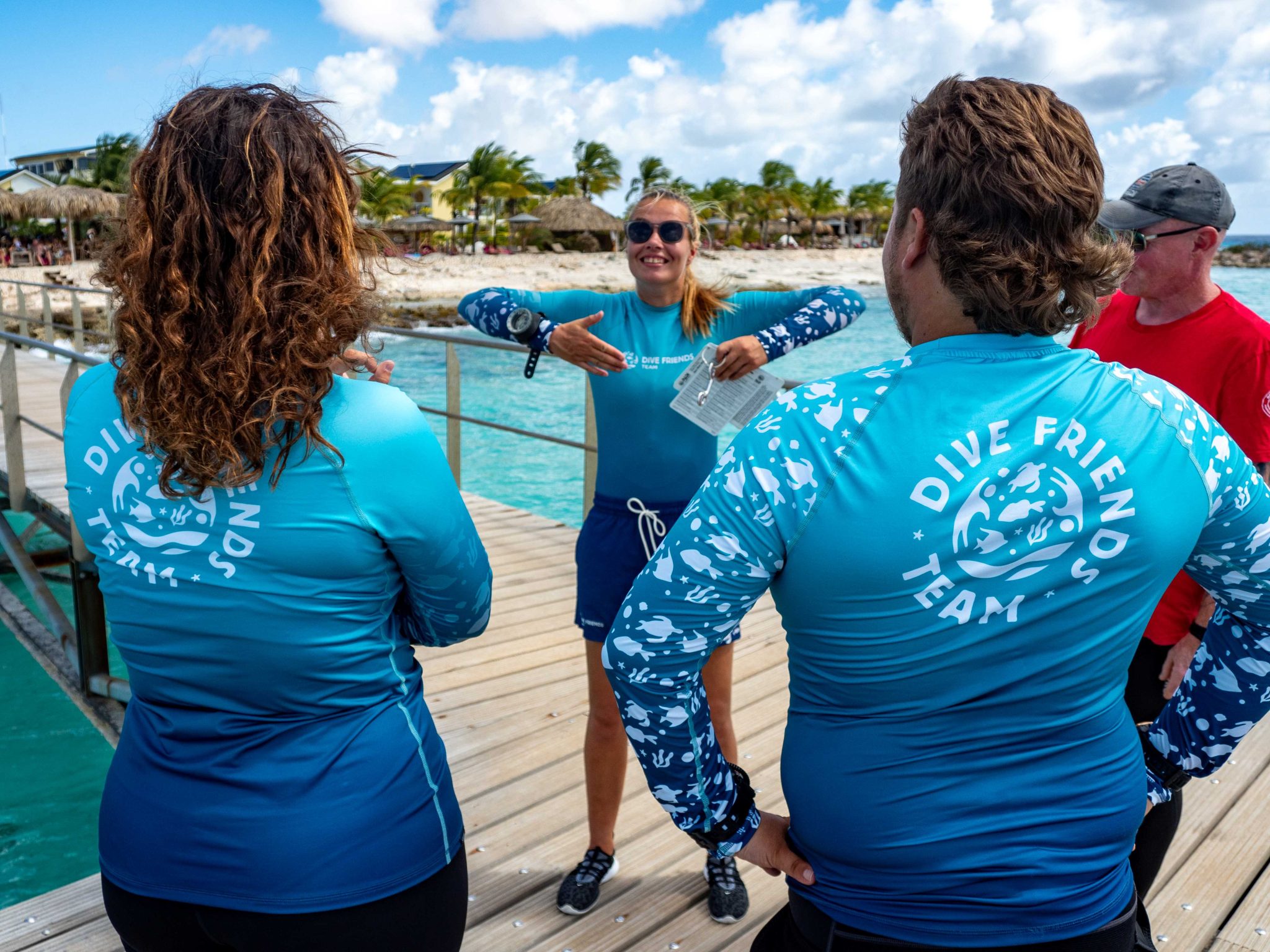
Dive Friends teaches the Instructor Development Course (IDC) several times a year to students who are eager to share their passion for diving with the world.
Dive Friends is known for the personal approach throughout the course. Their in-house course director will lead the students through every essential step, mentoring them to achieve their fullest potential as a dive instructor.
Applications for the following IDC start dates are now open:
- 12 April
- 5 July,
- 20 September
- 29 November
Partnership with Casita Palma
If the student opts for the IDC-Deluxe or IDC-Supreme package, their accommodation will be arranged for them at Casita Palma. This small and quiet resort is within walking distance from Dive Friends Bonaire’s main dive shop location and has everything you need to relax after an intense day of IDC training. Breakfast is included, so the student will always be fuelled and ready for their day.
Contact Dive Friends Bonaire’s Course Director Eddy for more information: coursedirector@divefriendsbonaire.com.
-

 News3 months ago
News3 months agoHone your underwater photography skills with Alphamarine Photography at Red Sea Diving Safari in March
-

 News2 months ago
News2 months agoCapturing Critters in Lembeh Underwater Photography Workshop 2024: Event Roundup
-

 Marine Life & Conservation Blogs2 months ago
Marine Life & Conservation Blogs2 months agoCreature Feature: Swell Sharks
-

 Blogs2 months ago
Blogs2 months agoMurex Resorts: Passport to Paradise!
-

 Blogs2 months ago
Blogs2 months agoDiver Discovering Whale Skeletons Beneath Ice Judged World’s Best Underwater Photograph
-

 Gear News3 months ago
Gear News3 months agoBare X-Mission Drysuit: Ideal for Both Technical and Recreational Divers
-

 Gear Reviews2 months ago
Gear Reviews2 months agoGear Review: Oceanic+ Dive Housing for iPhone
-

 Marine Life & Conservation2 months ago
Marine Life & Conservation2 months agoSave the Manatee Club launches brand new webcams at Silver Springs State Park, Florida











